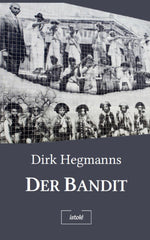With the novel "The Bandit", the author and Brazil expert Dirk Hegmanns creates an authentic and fascinating picture of Brazil at a time that marks the beginning of major upheavals in the country's society.
In a conversation with the publisher, the author commented on the importance that this topic has in the modern world.
Author interview with Dirk Hegmanns

With your new book “The Bandit” you address the social conflicts that arose between large landowners and small farmers in northeastern Brazil around 1900. Can one speak of a “powder keg” that represented northeast Brazil at that time?
The northeast of Brazil is often referred to as the “poorhouse of Latin America,” and conflicts of various kinds characterize the history of this region. Above all, the strong concentration of land ownership in the hands of a few provoked a revolt from the landless and small farmers at the beginning of the 20th century. Lampião became the most famous fighter against injustice and the arbitrary power of the landlords.
What role did the historical Lampião play in the founding of Brazilian social movements?
Lampião can undoubtedly be considered a forerunner of the peasant movements that emerged shortly after his death. Almost everyone refers to him, despite the ambivalence that his character embodies. Although he took from the rich to give to the poor for many years, he later became a criminal who did not shy away from murder. This ambivalence is also brought out in the novel. In popular perception, however, he is largely revered as a folk hero who fought against arbitrary rule and injustice, and this is also understood as his legacy.
How does the work of your literary main character differ from its historical counterpart?
I generally stuck very closely to the historical guidelines and researched them for a long time. Since I conducted some research in northeastern Brazil and also taught as a visiting professor at the Federal University of Pernambuco, I was able to visit some original locations and collect extensive material. I have also done academic work on the topic of Cangaço and social banditry. Of course, I had to develop a dramaturgy for the novel and supplement it with fictional narrative threads, but that in no way diminishes the authenticity of the story.

As the author of this historical novel, what would have interested you in traveling back in time to Brazil around 1900?
I would have loved to take such a journey back in time. What interests me most is how people lived and how they coped with their everyday lives. Whenever I visit historical sites, I sit down and imagine the everyday lives of people, be they the Greeks, Romans or Brazilian small farmers in northeastern Brazil. As a student, I traveled to the Sertão, which can be beautiful, but demands an enormous amount from the people who live there.
How do you justify our European society's current interest in this aspect of Brazilian history?
There are a number of historical events in Brazil's history that have had a lasting impact on the country, its regions and its people. Knowing and understanding these events helps to understand the country and its people and their mentality. In this sense, literature is for me a vehicle to bring the reader closer to the country, people and mentality in an exciting and entertaining way. But you don't necessarily have to be a Brazil fan to do this. The history of the Lampião alone is exciting enough to be transported back to this time using the novel.
In addition to your work in development cooperation and humanitarian crisis intervention, you have always written novels. Was your main job never enough for you?
My main job usually put more strain on me than was good for my health. On the other hand, whether I wanted to or not, I kept coming across events or topics that captivated me and that I didn't want to let pass me by without comment. This resulted in stories that I believe are worth telling. The research also gave me other ideas and cooled down my overheated organism. I was able to immerse myself in the stories and push the enormous stress into the background for a while.

Did Lampião expect that concessions would be made to him and the small farmers or that he could benefit from an amnesty?
The hunt for Lampião - as for cangaceiros in general - was always characterized by ruthless violence. His hunters were by no means squeamish and in the Sertão, far away from the big cities, they didn't take the written law very seriously. They preferred a dead cangaceiro to a living one. After just a few years as cangaceiro, Lampião could no longer count on mercy because he had questioned and exposed the authorities too much. I think he knew very well what to expect. The pressure on him became more and more intense, but he always believed in the rightness of what he was doing.
The interview was conducted by Christian Leeck. Machine translated from German.
Wuppertal, March 2024.




